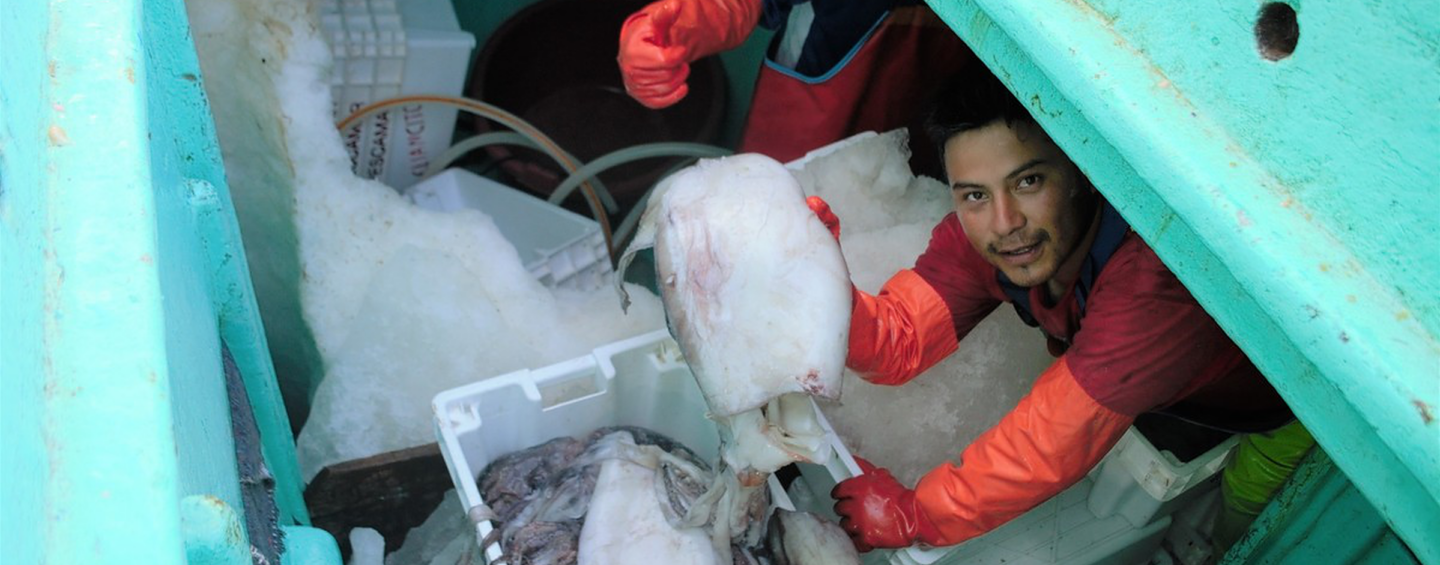Sustainable fisheries advocates have won a significant victory in the quest toward improving the sustainability of the world’s squid fisheries. At its 8th annual meeting in Vanuatu this month, the Commission of the South Pacific Regional Fisheries Management Organization (SPRFMO) issued the first-ever Conservation and Management Measure (CMM) for jumbo flying squid in international waters.
The South Pacific jumbo flying squid fishery, which accounts for approximately 30 percent by volume of the entire global squid catch, is fished by coastal state fleets from Chile and Peru, as well as long-distance fishing fleets from China, South Korea, and Taiwan. In Peru alone, jumbo flying squid is the second-largest fishery in the country and the most important for the artisanal sector. Peru’s squid capture sector involves more than 11,000 fishers and 3,000 vessels, generating exports of more than $860 million per year.
This CMM, which will regulate the capture of jumbo flying squid in international waters, is an important first step toward addressing some of the key science and management deficiencies in the fishery.
This achievement is due in part to the efforts of the Committee for the Sustainable Management of Southern Pacific Jumbo Squid (CALAMASUR), an industry-led organization that represents squid producers, processors, and exporters from Chile, Ecuador, Mexico, and Peru. Sustainable Fisheries Partnership provides technical and scientific support to the organization, which was established in 2018.
Alfonso Miranda Eyzaguirre, chair of CALAMASUR, attended the SPRFMO meeting to express his organization’s concerns about sustainability in the jumbo flying squid fishery and to reiterate demands that CALAMASUR first presented at the Commission’s 2019 meeting in Havana, Cuba. “The unanimous approval of the first jumbo squid management and conservation measure issued by SPRFMO is great news for everybody,” Miranda Eyzaguirre said.
The measure, which will go into effect in January 2021, was proposed at the meeting by the European Union, which acknowledged the important work of CALAMASUR in promoting the sustainability of the squid fishery. The CMM will define operational guidelines to help improve sustainability practices in the fishery.
One of the first challenges for the Peruvian squid fleet with the new guidelines will be the installation of satellite equipment for vessel monitoring systems on artisanal fishing vessels. According to a report by Global Fishing Watch, approximately 400 Peruvian artisanal squid fishing vessels are currently equipped with these satellite systems, and by the end of March, a total of 700 ships will have the systems. Other guidelines relate to the preparation of catch reports per vessel, the design of a biological monitoring system for research purposes, increased observer coverage, and the inclusion of Peruvian artisanal vessels in the registry of vessels fishing in international waters that is monitored by SPRFMO.
The CMM also pushes the Peruvian government to accelerate legalization of the “informal” artisanal squid fleet by the time the measure goes into effect 10 months from now.
“The jumbo flying squid fishery is the most important squid fishery in the world. Having a CMM for this fishery agreed upon by the SPRFMO member states is a crucial first step toward sustainable utilization of the resource and will set the stage for further improvements in squid fisheries globally,” said Enrique Alonso, SFP’s global fisheries director.
Miranda Eyzaguirre said that his organization is committed to ensuring the effective implementation of this new measure: “CALAMASUR will work hard to disseminate the agreements and commitments achieved in Vanuatu, so that all stakeholders involved in the jumbo flying squid fishery are able to participate and monitor the implementation of the new measures, to help achieve the sustainability of the resource.”

